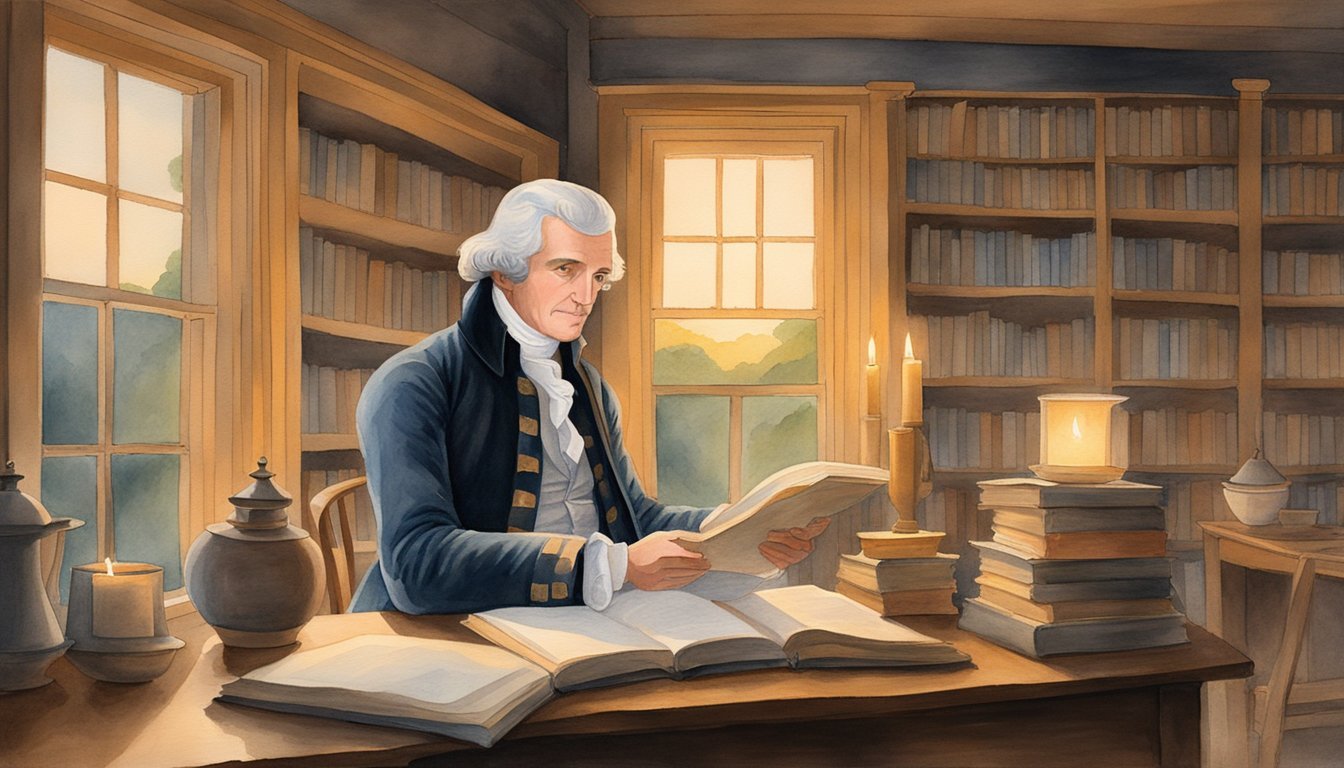Early Life and Career

Thomas Jefferson was born on April 13, 1743, at the Shadwell plantation in Virginia. He was the son of Peter Jefferson, a successful planter and surveyor, and Jane Randolph, a member of one of Virginia’s most distinguished families.
Education and Law Practice
Jefferson began his formal education at the College of William and Mary in 1760, where he studied philosophy, mathematics, and science under the guidance of his mentor, Professor William Small. During his time at the college, he became friends with George Wythe, who later became one of America’s most eminent jurists and mentors to future Presidents. After completing his studies, Jefferson studied law under Wythe’s tutelage and was admitted to the Virginia bar in 1767.
As a practicing lawyer, Jefferson took on various cases and was known for his meticulous preparation and thorough understanding of Virginia’s complex legal system. His legal career also exposed him to the workings of the colonial government, particularly the House of Burgesses, where he observed the political processes in action.
Political Beginnings
Jefferson’s political career began when he was elected to the Virginia House of Burgesses in 1769. As a member of the House, he became a vocal advocate for American rights and independence. He drafted several legislative proposals to address colonial grievances against British rule. Most notably, his Summary View of the Rights of British America (1774) argued for extensive political and economic autonomy within the British Empire.
Jefferson’s growing prominence as a statesman led to his appointment as a delegate to the Continental Congress in 1775. Here, he was tasked with drafting the Declaration of Independence, a role that would solidify his place in history as one of America’s Founding Fathers.
Throughout his early life and career, Thomas Jefferson showed a strong commitment to the development of the United States. His experiences in the fields of education, law, and politics laid the groundwork for his future contributions as a statesman, writer, and President.
Presidency and Later Life

Vice Presidency and Election of 1800
Thomas Jefferson served as the second vice president of the United States under President John Adams from 1797 to 1801. They had a tense relationship due to their differing political affiliations: Adams was a Federalist while Jefferson was a Democratic-Republican.
In the Election of 1800, Jefferson ran against the incumbent President Adams. The intense campaign saw Jefferson winning after a tie in the Electoral College that was eventually resolved with the help of Alexander Hamilton. He was inaugurated as the third president of the United States on March 4, 1801.
Achievements and Controversies
Jefferson’s presidency was marked by numerous achievements and controversies. One of his most notable accomplishments was the Louisiana Purchase in 1803, which saw the United States acquiring a vast territory spanning from the Mississippi River to the Rocky Mountains from France, doubling the size of the nation. He also contributed to the establishment of the University of Virginia and the drafting of the Virginia Statute for Religious Freedom.
Jefferson faced various challenges as well. The Embargo Act of 1807 was an economic decision made in response to the Napoleonic Wars and trade restrictions imposed by Great Britain and France. The act, which intended to protect U.S. interests by prohibiting exports to foreign nations, ultimately backfired and hurt the American economy.
Retirement and Legacy
After serving two terms as president, Jefferson retired to his home, Monticello, in Virginia. He spent his retirement focusing on his interests in science, education, and book collecting. Jefferson played a significant role in the founding of the University of Virginia and helped design its campus.
His vision for religious freedom and separation of church and state were revolutionary for his time, as was his belief in education for all. However, his life was also mired in controversies, including his relationship with Sally Hemings and his ownership of slaves, which stands in contrast to his famous declaration that “all men are created equal.”
Despite these controversies, Thomas Jefferson remains a monumental figure in American history who played a significant role in shaping the foundations of the United States and its development as a democratic nation.

